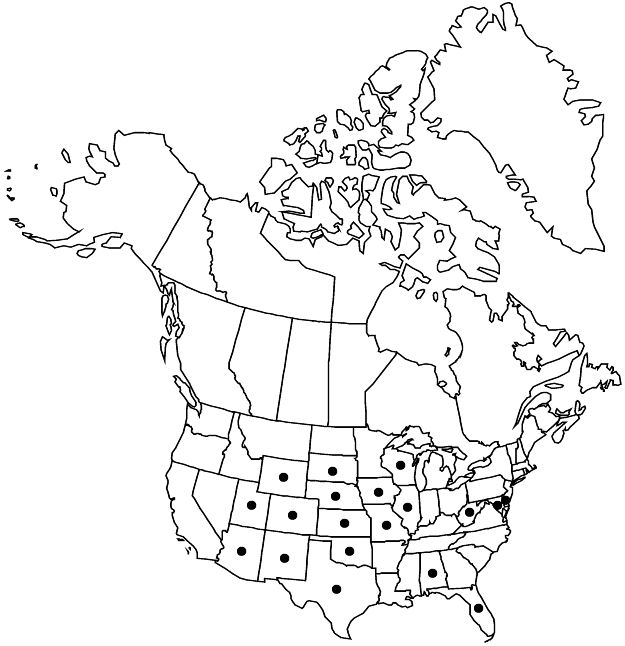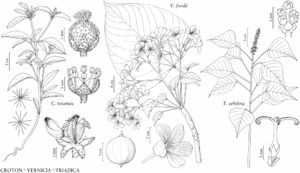Difference between revisions of "Croton texensis"
Prodr. 15(2): 692. 1866.
FNA>Volume Importer |
FNA>Volume Importer |
||
| Line 22: | Line 22: | ||
|name=Croton luteovirens | |name=Croton luteovirens | ||
|authority=Wooton & Standley | |authority=Wooton & Standley | ||
| − | }}{{Treatment/ID/Synonym | + | }} {{Treatment/ID/Synonym |
|name=C. texensis var. utahensis | |name=C. texensis var. utahensis | ||
|authority=Cronquist | |authority=Cronquist | ||
| − | }}{{Treatment/ID/Synonym | + | }} {{Treatment/ID/Synonym |
|name=C. virens | |name=C. virens | ||
|authority=Müller Arg. | |authority=Müller Arg. | ||
| Line 43: | Line 43: | ||
|elevation=50–2000 m. | |elevation=50–2000 m. | ||
|distribution=Ala.;Ariz.;Colo.;Del.;Fla.;Ill.;Iowa;Kans.;Md.;Mo.;Nebr.;N.Mex.;Okla.;S.Dak.;Tex.;Utah;W.Va.;Wis.;Wyo.;Mexico (Chihuahua;Sonora). | |distribution=Ala.;Ariz.;Colo.;Del.;Fla.;Ill.;Iowa;Kans.;Md.;Mo.;Nebr.;N.Mex.;Okla.;S.Dak.;Tex.;Utah;W.Va.;Wis.;Wyo.;Mexico (Chihuahua;Sonora). | ||
| − | |discussion=<p>Croton texensis, despite being annual, grows larger than the related perennial C. dioicus. Croton texensis has verrucose fruits similar to those of the closely related C. parksii.</p><!-- | + | |discussion=<p><i>Croton texensis</i>, despite being annual, grows larger than the related perennial <i>C. dioicus</i>. <i>Croton texensis</i> has verrucose fruits similar to those of the closely related <i>C. parksii</i>.</p><!-- |
| − | --><p>There is a single specimen of Croton texensis from Massachusetts, collected at a dump in Boston in 1890, but the species did not become established there.</p> | + | --><p>There is a single specimen of <i>Croton texensis</i> from Massachusetts, collected at a dump in Boston in 1890, but the species did not become established there.</p> |
|tables= | |tables= | ||
|references= | |references= | ||
| Line 68: | Line 68: | ||
|publication year=1866 | |publication year=1866 | ||
|special status=Weedy;Selected by author to be illustrated | |special status=Weedy;Selected by author to be illustrated | ||
| − | |source xml=https://jpend@bitbucket.org/aafc-mbb/fna-data-curation.git/src/ | + | |source xml=https://jpend@bitbucket.org/aafc-mbb/fna-data-curation.git/src/8f726806613d60c220dc4493de13607dd3150896/coarse_grained_fna_xml/V12/V12_405.xml |
|genus=Croton | |genus=Croton | ||
|species=Croton texensis | |species=Croton texensis | ||
Revision as of 14:46, 18 September 2019
Herbs, annual, 2–7(–9) dm, dioecious. Stems loosely branched distally, stellate-hairy. Leaves not clustered; stipules absent; petiole 0.3–2 cm, glands absent at apex; blade narrowly ovate-oblong to linear-lanceolate, 1–5 × 0.5–2 cm, base truncate to rounded or subcordate, margins entire, apex rounded to acute, abaxial surface pale green, densely whitish appressed stellate-hairy, adaxial surface darker green, less hairy. Inflorescences unisexual; staminate racemes or irregularly branched panicles, 2–8 cm, flowers 10–30; pistillate racemes, 1–2 cm, flowers 1–6. Pedicels: staminate 2–3 mm, pistillate 1–3 mm. Staminate flowers: sepals 5, 1–2 mm, abaxial surface densely whitish appressed stellate-hairy; petals 0; stamens 8–12. Pistillate flowers: sepals 5, equal, 1–1.5 mm, margins entire, apex incurved, abaxial surface densely stipitate-stellate-hairy; petals 0; ovary 3-locular; styles 3, 1–2 mm, multifid, terminal segments 12–32+. Capsules 5–8 × 4–5.5 mm, verrucose; columella 3-winged. Seeds 3.5–4 × 2.5–3 mm, shiny. 2n = 28.
Phenology: Flowering Jun–Nov.
Habitat: Prairies, sandy creek beds, old fields, canyons, disturbed areas.
Elevation: 50–2000 m.
Distribution

Ala., Ariz., Colo., Del., Fla., Ill., Iowa, Kans., Md., Mo., Nebr., N.Mex., Okla., S.Dak., Tex., Utah, W.Va., Wis., Wyo., Mexico (Chihuahua, Sonora).
Discussion
Croton texensis, despite being annual, grows larger than the related perennial C. dioicus. Croton texensis has verrucose fruits similar to those of the closely related C. parksii.
There is a single specimen of Croton texensis from Massachusetts, collected at a dump in Boston in 1890, but the species did not become established there.
Selected References
None.
